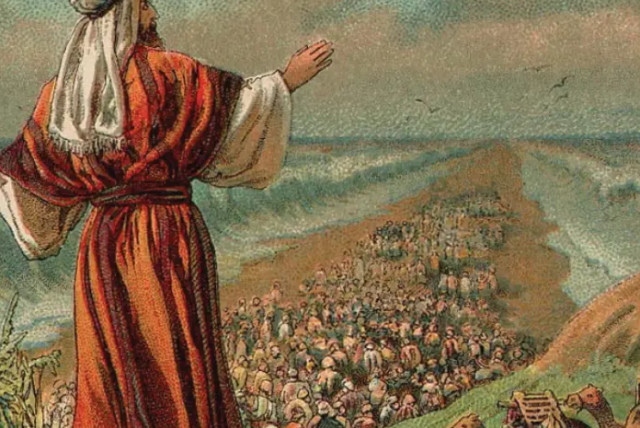Does religion inherently require conformity? - opinion

It is interesting to consider what direction the Orthodox Jewish world will take in the next few generations. Will the conformism of the past 500 years, which has become so popular, continue?
Leaders are only fully appreciated once they retire and Moses, our greatest leader, was no different. Once it was announced that he would not direct us into the Land of Israel, it became apparent that replacing him would be a daunting task. Who could possibly fill his giant sandals?
Heroically, Moses’s first thoughts, upon receiving his harsh sentence, turned to his successor. Before considering his own legacy or lamenting his harsh and tragic fate, he petitions God to select a new leader with requisite leadership traits. It is a touching scene of undying devotion and selflessness.
When describing his potential successor, Moses refers to God as the “God of all human lives,” a rare term that appears only twice in the entire Torah. This phrase alludes to the divine capacity to craft human beings with diverse personalities and different character traits.
Even though our DNA is almost completely identical, God endowed each of us with individual identities, diverse features, and differing viewpoints, interests, and ideas. Only the “God of all lives” can produce such broad diversity within one species that we call homo sapiens.
By referring to God in this manner, Moses affirms that leaders must cultivate diversity rather than stifle personality differences or homogenize their community. Throughout his own career, Moses demonstrated uncanny range as a leader. He had scaled the heavens and split the seas. He had defied a brutal tyrant and brought a superpower to its knees.
Yet, he also understood the dark side of humanity and he appreciated the frailty of the human condition. Embracing a nation of fallen sinners, he valiantly prayed for their restoration and actively assisted in their religious rehabilitation.
The importance of personalized religious experiences and conformity
Moses personally knew how critical it is for a leader to appreciate individual differences while promoting diversity, and he pleads with God for a replacement with a similar sweep and with the same leadership vision.
Personalized religious experience will always yield a deeper and more authentic religious identity, whereas extreme religious conformity suppresses individual expression and can degenerate into rote ritual performance and unexamined religious experience. By individualizing religious experience, it can become more passionate and more genuine.
Yet, despite the value of personal expression, religion demands broad-scale conformity. We are expected to submit to universal divine commandments that do not discriminate between individuals. Beyond common rituals, religion also demands suppressing personal opinions and beliefs to abide by predetermined articles of faith.
Religious life lies at the very delicate intersection between individualism and traditionalism. We are expected to carefully calibrate between independent thought and conventionalism. Too much conformity and religious experience feels plastic. Too much unrestrained self-expression and we turn away from God and from our sacred traditions.
OVER THE past 2,000 years, several events pressured us into greater religious conformity. Halacha and Jewish law always allowed for a relative degree of diverse practice. In theory, Jewish law is somewhat “elastic,” as it acknowledges multiple truths, provided they cohere with original texts and earlier interpretations. The Talmud itself is predicated upon dissent and dispute, with the implicit assumption of multiple truths.
The harsh reality of exile though, changed the equation. Scattered across distant lands without common geography, statehood, or nationality, our communal integrity depended entirely upon common religious practices and a unified culture. As we faced constant expulsions and forced relocations, halachic diversity became less manageable. Common halachic practice remained the one “constant” in Jewish communal life; the more homogenous, the easier it was to maintain communal stability within the chaos of medieval Europe.
Under the stress of exile, religious practice, understandably, tilted toward greater conformism. Especially in Western Europe, which viciously persecuted Jews and consistently expelled them, the unflinching loyalty to customs, let alone actual Jewish law, became unconditional. Conformity was the only glue that could bind us into common communities. For glue to be effective, it must possess a high degree of viscosity. Conformity provided that viscosity.
This phenomenon came to a head in the 16th century, in the aftermath of the Spanish Inquisition. Waves of wealthy and highly educated Spanish Jews emigrated across the Jewish world, bringing with them their respected and influential traditions, which often clashed with the local traditions of both Western European and Arabic Jewish communities. This demographic tumult destabilized halachic practice and opened serious communal fissures. Something had to be done.
In response, Rabbi Joseph Karo, himself a refugee from Spain who resettled in Safed, revolutionized Jewish practice by authoring the Shulhan Aruch, offering a standard system of halachic decision-making. Jewish legal rulings would no longer be based upon the individual interpretation of a particular local rabbi, but would now be universalized into one common system and one standardized approach.
Though some of his contemporaries disagreed with the basic concept of standardizing religious practice, history ruled in his favor, and his approach and his work became the gold standard for Jews across the world. The adversity of Jewish exile had compelled us to greater conformity.
IRONICALLY, 300 years later, an opposite force would propel us, once again, toward greater conformity. During the medieval period, antisemitism and expulsions had destabilized the Jewish world, promoting greater halachic conformity. Beginning in the 19th century, Jewish emancipation, which is contradictory to antisemitism, removed many of the barriers that had traditionally prevented Jews from entering mainstream society.
However, as the modern world was quickly turning secular and even disdainful of religion, this invitation to rejoin society threatened our religion and culture.
Some breakaway groups of Judaism altered their halachic practice to better reflect social expectations and broader cultural norms. Orthodox Jewry however, remained unwavering in its commitment to classic halachic behavior. To protect itself against cultural encroachment, Orthodox society, at large, became more insular, and, by extension, more conformist.
In some respects, the highly coded haredi culture is a response to the perceived threats of a religiously hostile modern world. Even more revealing is the extreme insularity and conformism of the modern hassidic world.
This movement, launched in the early 18th century, originally envisioned a community that would embrace a broader range of Jews. Successive waves of modern secularization however, and the horrors of the Holocaust which disproportionately victimized the hassidic world, turned this society inward, into self-preservationist mode.
Hassidic societies have become extremely insular with highly coded dress, behavior, and thought. This insularity is a vivid example of the impact of a secular, modern world upon Jewish conformity and insularity.
NOW THAT we are regathering in our common homeland and our national Jewish identity is more native, many Orthodox Israelis are experimenting by exploring a more personalized religious experience. Confident in their Jewish identity, they are examining new horizons of religious expression, hoping to craft a more authentic religious identity.
It is interesting to consider what direction the Orthodox Jewish world will take in the next few generations. Will the conformism of the past 500 years, which has become so popular, continue? Or will there be a shift back to a more diverse and individualistic approach to religious identity and experience, hopefully all within the confines of halachic fidelity and Orthodox commitment? No one knows where this is all heading. ■
The writer is a rabbi at Yeshivat Har Etzion/Gush, a hesder yeshiva. He has smicha and a BA in computer science from Yeshiva University as well as an MA in English literature from the City University of New York.
Jerusalem Post Store
`; document.getElementById("linkPremium").innerHTML = cont; var divWithLink = document.getElementById("premium-link"); if (divWithLink !== null && divWithLink !== 'undefined') { divWithLink.style.border = "solid 1px #cb0f3e"; divWithLink.style.textAlign = "center"; divWithLink.style.marginBottom = "15px"; divWithLink.style.marginTop = "15px"; divWithLink.style.width = "100%"; divWithLink.style.backgroundColor = "#122952"; divWithLink.style.color = "#ffffff"; divWithLink.style.lineHeight = "1.5"; } } (function (v, i) { });

